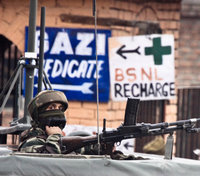The idyllic valley of Kashmir has been gripped by violence for more than three months now. Unlike past unrest, however, this summer's riots have seen a new generation of young Kashmiris venting their anger at a central government that has failed to capitalize on the stability of recent years to provide them with economic opportunities and political reconciliation. The state government led by the telegenic, much-hyped Omar Abdullah waited almost two months after the initial violence to begin outreach efforts, by which time more than 50 people had already died in street protests and police action.
New Delhi, too, stayed on the sidelines as the situation deteriorated. After squandering various opportunities for making real political progress over the last few years, the central government's only substantive response was to once again deploy the Indian army to Kashmir, after a hiatus of 15 years. But the armed forces are being made a scapegoat for the political failures of leadership at both the central and state levels. Unable to intervene effectively against the stone-throwing mobs, they instead contribute to the vicious cycle of deaths leading to protests that, in turn, lead to more deaths, which continues unabated. Now even the state government itself has demanded that New Delhi reduce the footprint of security forces in Kashmir.
An all-party delegation has been sent by New Delhi to the valley to meet with Kashmiri stakeholders -- including separatist parties -- in the hope of identifying measures that would at least partially address Kashmiri grievances and initiate a dialogue under peaceful conditions. Indian Prime Minister Manmohan Singh has made it clear that the government is willing to reconsider the presence and role of security forces in the state, ensure greater public accountability for crimes against Kashmiris, and consider demands for autonomy within the parameters of the Indian constitution. But separatist leaders have already made it clear that they do not expect any positive result from the process.

